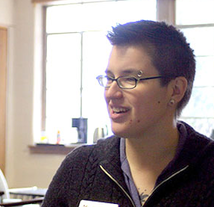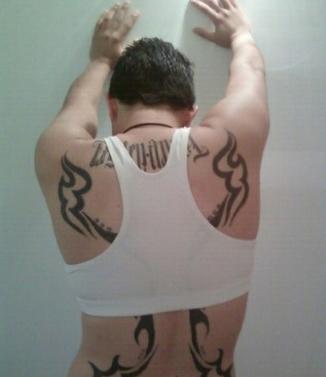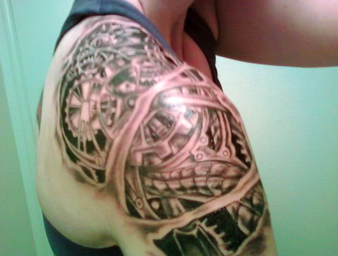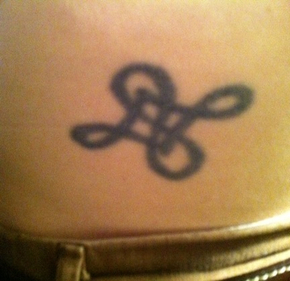|
Many readers have written that it's tough to meet like-minded women, especially if you live in a small town or have a career that rarely puts you in contact with other women-lovin’ chicks!
When I was actively dating, I dabbled (okay, more than “dabbled”) in online fora, partly because Match, OKCupid, and Yahoo! Personals were quieter, less irritating places to meet people than in bars, and partly because I could pretend to be socially active while sitting in my recliner drinking a Fat Tire. Although I didn’t find lasting love in cyberspace (though I made some great friends), I highly recommend it. Here are a bunch of easy tips to get you started. Some are written with butches in mind, but most apply to everyone:
What has been your strangest online dating experience? Any tips to add to the list? Any questions about things I haven't covered here?
14 Comments
 Photo from: http://revrohrer.blogspot.com I recently interviewed Rev. Megan Rohrer, a pastor in the ELCA Lutheran Church who identifies as butch, dyke, queer, and trans (Rev. Rohrer is the first openly transgender pastor in the Lutheran church). I hope you'll enjoy her remarkably candid answers--about everything from divinity to her dating life--as much as I did! BW: How did you decide to become a minister? What was the timing re: coming out and joining the clergy?
Pastor Megan Rohrer (PMR): I never had a moment of being in the closet. I kissed a girl in college and then immediately became a poster child of all things gay - in South Dakota of all places. The backlash was primarily religious. So I began reading to be able to have words to describe what I always knew was true: that God loved me and there was nothing I could do to screw it up. After reading all the books I decided to become a religion major. I had previously been an art major studying sculpture. BW: What college were you at? PMR: I was at Augustana College in Sioux Falls, a Lutheran college. BW: Were many people there out as queer? PMR: There were a few, but it was a tough time. It was right after Matthew Shepard's death and there was a conservative Christian backlash. Folks tried to exorcize "gay demons" from us and drunk football players would knock on my door at night to "make me straight." I had to move off campus for about 3 months. BW: Did you see a conflict between your religion and your sexual orientation? PMR: Never. BW: Were you raised Lutheran? PMR: Yes, Lutheran is to South Dakota what being Jewish is to Israel. It's so engrained in the culture, the news, holidays, everything. But [being a gay pastor] wasn't allowed in the Lutheran church then. BW: So you were a pretty religious kid? PMR: I had had mystical experiences since I was five and always had an inner sense God was with me and for me. I used to sneak off to church when I was in middle school and not tell my family. I didn't really agree with the fundamental beliefs of the church I went to, but I loved the rituals and music. Lutheran worship is mostly sung, and I've always loved music. BW: Can you tell us a little more about your decision to become a pastor? PMR: When I was a senior in high school everyone told me I should be a pastor, but I wanted to be an artist. Then when I became a religion major, I wanted to be a pastor but I couldn't handle the fight after living through the violence at college. Since [being a gay pastor] wasn't in allowed in the church back then, I didn't want to fight. BW: But something changed your mind? PMR: Well, I became a counselor for abused children aged 3-12. When a 6-year-old who had tried to commit suicide 12 times crawled on my lap to tell me he wanted to die before he was too bad and had to go to hell, I knew I need to go to seminary and be trained as a pastor. I moved to Berkeley to become a pastor when I was 21. BW: Wow. Did it feel like a natural fit at the time? PMR: No, and it doesn't feel natural now. I still sometimes wish I could have another job, because it's very, very hard, lonely work. But, I am certain that there is nothing else I could do and that I'd still be the one people cry to on public transportation and talk to about God stuff. When I started working with the homeless in 2002, they always called me pastor. I used to give them a long explanation about why the Lutheran church didn't allow gay people to be pastors. They just responded by saying: "Whatever, Pastor." I think people notice that mystical things happen to me all the time. I'm the person who asks that follow up question that seems to come right out of someone's brain, helps them feel seen, or gets them to finally ask for help. BW: When does your role as a pastor feel the most natural? PMR: It feels natural when I get emails from people saying that reading about me helped them decide not to kill themselves, when I see my homeless people get housing, or when someone says: "I believed it when they said God couldn't love me, but you've helped me see that God's love can be big enough to love even me." BW: In your denomination, who gets to go to heaven? PMR: Lutheran theology is fantastic because it believes that everyone is simultaneously a saint and a sinner and there is nothing we can do about it. It holds that everyone is equally sinful and that God loves us regardless of how we live. The idea is, if you don't have to worry about your salvation, you will do more to care for the world and do justice. Martin Luther is famous for saying: "sin boldly, but believe more boldly still." BW: What does it mean to "sin boldly?" In my mind it seems like: "Don't steal a candy bar--instead, rob a bank!" PMR: It could mean that in its extreme. Sin boldly means, take a stance and have faith that where you stand is the right thing. It's probably very similar to a butch ethic. It suggests that in love you should be strong and act boldly. This does not mean you should be abusive or overly aggressive. But, if you have robbed a bank, regardless of your reasons, God will still love you. BW: Are some kinds of love favored over others? For example, a heterosexual married relationship? PMR: I don't think any kind of love is favored over others. There are many types of relationships in the Bible. The Book of Hosea compares human love to love between a heterosexual man and a prostitute, and Godly love to that between God and the Sons of Israel. There are queer metaphors, trans metaphors, kinky sex metaphors, and calls to be celibate. It's a really diverse book, but most pastors don't talk about the juicy parts out loud... I think some Christians have confused God with Santa Claus who keeps a list, or Keebler Elves that are just supposed to give us wonderful things, but I think it's more about being people trying to learn how to love and accept love from something bigger than we are. BW: You make it sound so clear cut! Why do so many kinds of Christianity reject homosexuality or label it as a sin? PMR: Many Christians reject homosexuality because of the King James version of the Bible. It is the first time that homophobia appears in the translations. They were created because King James slept with men. People who could not say anything bad about the king (without being beheaded) put it in the translation... Then those ideas were taught around the world by missionaries who tried to colonize and convert people. BW: Doesn't the NIV version have some anti-gay stuff in it, too? PMR: All the later translations got their language from the King James. The words in the original Greek are unclear. But even if homosexuality was a sin, Jesus says his anger is but a moment and his love endures forever and that nothing--neither death, nor life, nor things present, nor things to come--can ever separate us from God's love. The tradition of acceptance in religions of all faiths is much older than this contemporary idea that it's sinful. Ancient Rabbis believed that gay people were created by God. BW: I bet that if they were raised with you as their pastor, more gay people would be religious! Why do you think so many gay people reject religion? PMR: There are many gay Christians--I meet them all the time. I think it's harder for people to be "out" about their Christianity in the gay community than it is for some people to be out [as gay] in society. BW: How do you identify within the queer community? PMR: I identify as queer, trans, dyke and butch. BW: I've written about the tension between female-identified butches and FTMs. Do you feel that, as someone who identifies as both trans and a dyke? PMR: I do feel that. I grew up thinking that everyone felt body dysphoria--that's what all the after-school specials said about female bodies. So I learned to love my body even when it didn't feel like the body I would have chosen. But my trans brothers are unbelievably strong, and I mourn their loss of community when the butch community rejects them. Often this happens because people are afraid to admit they have similar feelings or that sometimes it would feel good to have male privilege and not get harassed all the time. BW: So you identify as trans, but are not physically transitioning? PMR: I have learned never to say never when it comes to making statements about whether I will transition. This [female body] is what works for me now. I grew up watching movies where I wanted to get the girl in the end, so it meant that I had to imagine that I was the leading male. I think it's easy for my brain to go there and fantasize about that. BW: I guess that begs the question: why not physically transition? PMR: Currently, I don't shave my legs and I'm uninterested in shaving my face. I'm lucky I'm known as trans, because I get the best of both worlds. I can be seen as male (when I want to be) and keep my body the way it is. But when my doctors told me I needed breast reduction surgery to help with back pain, it was a long process to decide if I should make my chest more masculine or more feminine. Both felt wrong to me, so I didn't have surgery and I do physical therapy. Also, I've always felt like I physically want to have a baby, so I may feel very differently after that happens (though I'm not currently working on that, either). BW: Do you ever present as male in your church? PMR: Any time I wear a pastor collar people think I'm a "Father." It's because most people can't think of any butch pastors. I have bound and packed at church. Most people can't tell because the robe on top gets rid of any distinction. BW: Do the folks in your congregation address you with male pronouns, female ones, or both? PMR: It's a mixture. Some use male, some female. Some just say pastor. I once talked to a man at the end of the service who said until the sermon he thought I was a man, and then I became a woman. I appreciated that he had seen both natures inside of me. BW: Who do you tend to date? Butches, femmes? Men, women? Trans people? Everyone? PMR: I've dated all kinds of people, with all kinds of bodies. I'm very attracted to curves and soft skin. But I believe that if I transitioned that I'd likely be attracted to men. Very close to each other on the gender spectrum is the shift between a butch woman and a nelly [effeminate] man. When I present as male, it's a very feminine one. I find that when people accept my masculinity and my butchness, I can explore my soft sides that like to be comforted and taken care of. Someone recently told me I'm like a bear, without the beard. BW: Why do you think you'd be more attracted to men if you transitioned? PMR: It's pretty common when people transition. Some people think it's because instead of being attracted to a sex, people may be attracted to like bodies. BW: I prefer my partner to have the same level of masculinity as me. PMR: It's not very common for butches to be able to date each other and explore those dynamics. Perhaps if it was more common we could have a fuller sense of what we like and explore all the parts of ourselves. BW: At what point do you tell someone you're dating what your occupation is? Is being a pastor something you put in an online dating profile? PMR: I put a picture of myself in my clergy collar on my profile. If someone has a problem with my being a pastor, we should not date. BW: I bet some people think it's a costume and that you're being ironic. PMR: I think the faux hawk, tattoos, and piercings help people see I'm not a scary pastor... The picture I post in my collar is actually of me blowing a very large bubble--since I probably am more surprised that I'm a pastor than anyone else is. I also write in my profile that I'm a pastor, and about how I do things like Lady Gaga Mass. BW: Lady Gaga mass?! I have to know more... PMR: Martin Luther changed pub tunes into Christian lyrics. But the songs all seem boring nowadays. I followed his lead and changed the lyrics of some contemporary music. I also do Beatles Mass and a Bob Dylan Mass. BW: That sounds fun! I just googled Lady Gaga mass and found your YouTube channel. I bet that isn't what most people think of when they think of church! PMR: Right! It's true. Those videos are from the first time it was ever performed. Thankfully we've gotten better. We're doing a fundraiser in November where we're going to perform it with the Sisters of Perpetual Indulgence--that is going to be amazing! BW: Back to dating... If I saw a pastor's profile online, I would think: there's NO way I'm getting any action for a while. PMR: Yes, an often asked first date question is: can you have sex before marriage? I think it should go on the record that the greatest kept secret is that pastors are good in bed (when it's ethical and mutual and all that, not when it's any of the yucky stuff that appears in the paper). BW: The record shall so reflect! So I'll take that as a yes, pastors can have sex before marriage? PMR: Yes, we can. Oh, also: Something to think about is that a lot of kink culture comes from the sexualization of religious rituals. I'm just saying. BW: [Laughter] PMR: The Song of Songs is a very kinky book of the Bible. It's all about beautiful breasts and loving an ungendered person who is like a gazelle! BW: Would you ever date someone who did not share your faith? PMR: Oh of course. My longest relationships have been with Jews. I also feel madly in love with an atheist. I think what's important is how people live their life and how they love. There are lots of ways to share rituals and family without using words like: Jesus, God, salvation, etc. BW: Would you ever raise kids with a non-Christian? PMR: Yes. If I had a child I would want them to be baptized... But, it would be different if I was dating someone of another faith who already had a child. For example, Jewish traditions and rituals are where the Christian ones came from, so I think there's no need to double up. Kids are pretty smart and so much more in touch with faith than adults, so I think they are more than able to become amazing beings in interfaith families. BW: That's interesting. PMR: Oh, and pastors aren't allowed to be friends with people they meet at church. This is to help prevent some of the unethical sex scandals and jealousy that can come from getting to close to people in the congregation. But it means that although pastors are surrounded by hundreds of people all the time, it's incredibly lonely. BW: Wait, you can't even be FRIENDS with people you meet at church? PMR: It makes sense if you think about it. We act as counselors and know more about people than they do about us. And you can't really confide in them because people often confuse the faithfulness of their pastor with how God feels about them. BW: That's got to be hard. PMR: It is. Developing a strong group of friends is important. I find making friends with people of diverse faiths, or no faith at all, is important. It's great to have people who could care less about church, so we can be reminded that the whole world doesn't revolve around who spilled wax on the carpet. BW: Do you belong to a community of butch pastors? PMR: I don't know if there is a community of butch pastors, but I go on retreat every year with a group called Proclaim. It's the group of all the out queer pastors in the Lutheran church. It's like my family--to be able to spend time with them and have people around who understand the pressures of being a queer pastor. BW: What are those pressures? PMR: Being newly included in any community, there are pressures to be perfect. You can't talk about what is hard or ask for help in the same ways. But there are also ways in which I've been given a bigger voice and responsibilities because people want diversity and there are few queer pastors they can put in leadership. BW: Do you ever get any flak from the Lutheran Church about the stuff you do outside of church? PMR: Oh, no I haven't gotten any flak from the Lutheran Church. They actually hired me to blog for them because they like the way I write about advocacy issues. As the first transgender pastor ordained in the Lutheran church, there isn't really any precedent for how I ought to behave, so I get a lot of freedom. I'm very, very lucky! BW: I was thinking of your (excellent) photography work, "Everyday Drag" that was in Briarpatch earlier this year. PMR: I wondered how they would feel about that essay, but I got a lot of feedback, particularly from female clergy, that it captured some of the pressures they felt like they couldn't complain about in church. BW: What pressures do you think female clergy experience? PMR: As a female pastor, I've never been to church and not had someone comment on the outfit I was wearing, or my hair. Some male pastors talk over me, literally. And... my menstration will not stop during certain parts of a church service. There is something mystical that happens during communion and the sermon where I become afraid I will bleed more than is safe. I can't explain it or describe it, but it feels sacred. In Jewish tradition, menstruation is sacred because it is connected to life. I never understood that before I became a pastor. BW: That is intense. PMR: Ironically, it is menstruation that made it so that women could not be pastors for so long. There was a sense that we are unclean and couldn't have a ritual given to others during that time. But, I know deeply in my body that the in-church rituals I do during that time are so much more sacred. Sorry bio boys! BW: How does it feel to have a job that helps so many people? PMR: It feels humbling and I'm extremely grateful for the opportunities I've been given, for my health, for the luck and inner drive I've had that helps me be joyous when others are depressed. It reminds a bit like how it feels to get dressed up in a suit and tie. There is this power that I can take on that taps me into this greater energy. BW: That is the second analogy you have drawn between butchness and being a member of the clergy. It sounds like the two things are really symbiotic for you. PMR: Yes, I think there is a connection between the way that butches embody strength and giving. Pastors have a lot to learn from butch culture. BW: One last question: what advice or reading recommendations would you give to queer people who are interested in exploring queer-positive Christianity? PMR: There is a queer Bible commentary that is really great. Jay Baker, Sara Miles and Anne Lamott write some really good stuff that isn't as queer focused, but is queer affirming for a general audience. I also recommend Peterson Toscano's plays - they're hysterical. He has one about his failed attempt to become ex-gay and one about transgender Bible characters. BW: Thank you so much for your time--I learned a lot! PMR: It was great to chat with you. BW: This was way juicier than I expected. PMR: Fantastic! I'll admit it: personally, I'm tatt-less. I'm the kind of person who considers a bumper sticker too "permanent." What if I suddenly *don't* want to save whales or listen to NPR anymore? What if it turns out that "NPR" also stands for the National Project for Racism? What if people take it the wrong way? Silly, I know. And yet, my 30-year-old self wouldn't have been thrilled with whatever my 20-year-old self would have inked onto her body, which makes me wonder if my 40-year-old self will someday feel the same way about today's me. If I *had* to get a tattoo, I'd probably choose a cuff: a row of books like a library shelf, wrapping once around my upper arm. I'd have my all-time favorite books written in as the titles, leaving plenty blank for future favorites. (Yes, I am a dork. Surely, by now, that comes as no surprise.) In any case, I know that tattoos are often part of the lesbian fashion repertoire--and for good reason! At best, they can make your body into a sexy canvas. See exhibit A, sent in by a reader: I mean, yowza, right?? They can also just be super artistic. Here's another one someone sent in--one I thought was particularly cool: And of course, tattoos also have personal meaning for many of their wearers. Some of the tatts people sent in included people's names, special symbols, memorials, or spiritual/religious significance. For example, one reader has this ancient Christian symbol to ward off evil tattooed just southeast of her belly button (and yes, that placement is hot): So many dozens of butches sent in pictures of their tattoos that rather than choosing among them, I've made a slide show so you can see ALL of them. Enjoy! What a cool collection of pictures--thanks for the submissions!
Now, some questions for you:
Looking forward to reading your comments. |
|




 RSS Feed
RSS Feed